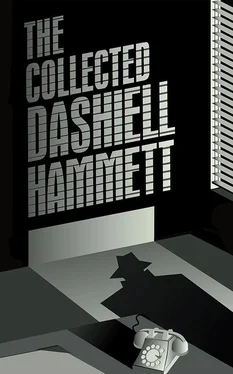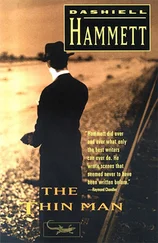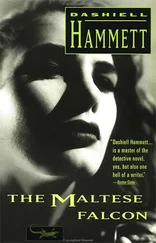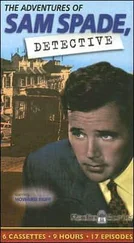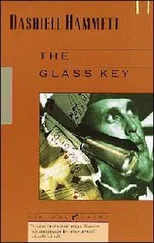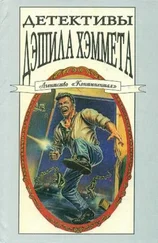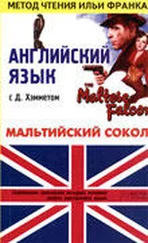Tony said, “Oh!” and his feet shuffled uncertainly on the road; but when he saw the girl making for my car he cried indignantly at her, “Listen, you can’t ride to town with—”
She was in my roadster by then. “Good night,” she said.
He faced me, shook his head stubbornly, began, “I’ll be damned if I’ll let—”
I hit him. The knockdown was fair enough, because I hit him hard, but I think he could have got up again if he had wanted to. I gave him a little time, then asked the fellow in the sedan, “All right with you?” I still could not see him.
“He’ll be all right,” he replied quickly. “I’ll take care of him, all right.”
“Thanks.” I climbed into my car beside the girl. The rain I had been trying to get to town ahead of was beginning to fall. A coupe with a man and a woman in it passed us going toward town. We followed the coupe across the bridge.
The girl said, “This is awfully kind of you. I wasn’t in any danger back there, but it was — nasty.”
“They wouldn’t be dangerous,” I said, “but they would be — nasty.”
“You know them?”
“No.”
“But they knew you. Tony Forrest and Fred Barnes.” When I did not say anything, she added, “They were afraid of you.”
“I’m a desperate character.”
She laughed. “And pretty nice of you, too, tonight. I wouldn’t’ve gone with either of them alone, but I thought with two of them...” She turned up the collar of her coat. “It’s raining in on me.”
I stopped the roadster again and hunted for the curtain that belonged on her side of the car.
“So your name’s Jack Bye,” she said while I was snapping it on.
“And yours is Helen Warner.”
“How’d you know?” She had straightened her hat.
“I’ve seen you around.” I finished attaching the curtain and got back in.
“Did you know who I was when I called to you?” she asked when we were moving again.
“Yes.”
“It was silly of me to go out with them like that.”
“You’re shivering.”
“It’s chilly.”
I said I was sorry my flask was empty.
We had turned into the western end of Hellman Avenue. It was four minutes past ten by the clock in front of the jewelry store on the corner of Laurel Street. A policeman in a black rubber coat was leaning against the clock. I did not know enough about perfumes to know the name of hers.
She said, “I’m chilly. Can’t we stop somewhere and get a drink?”
“Do you really want to?” My voice must have puzzled her; she turned her head quickly to peer at me in the dim light.
“I’d like to,” she said, “unless you’re in a hurry.”
“No. We could go to Mack’s. It’s only three or four blocks from here, but — it’s a nigger joint.”
She laughed. “All I ask is that I don’t get poisoned.”
“You won’t, but you’re sure you want to go?”
“Certainly.” She exaggerated her shivering. “I’m cold. It’s early.”
Toots Mack opened his door for us. I could tell by the politeness with which he bowed his round bald black head and said, “Good evening, sir; good evening, madam,” that he wished we had gone some place else, but I was not especially interested in how he felt about it. I said, “Hello, Toots; how are you this evening?” too cheerfully.
There were only a few customers in the place. We went to the table in the corner farthest from the piano. Suddenly she was staring at me, her eyes, already very blue, becoming very round.
“I thought you could see in the car,” I began.
“How’d you get that scar?” she asked, interrupting me. She sat down.
“That?” I put a hand to my cheek. “Fight — couple of years ago. You ought to see the one on my chest.”
“We’ll have to go swimming some time,” she said gaily. “Please sit down and don’t keep me waiting for my drink.”
“Are you sure you—”
She began to chant, keeping time with her fingers on the table, “I want a drink, I want a drink, I want a drink.” Her mouth was small with full lips, and it curved up without growing wider when she smiled.
We ordered drinks. We talked too fast. We made jokes and laughed too readily at them. We asked questions — about the name of the perfume she used was one — and paid too much or no attention to the answers. And Toots looked glumly at us from behind the bar when he thought we were not looking at him. It was all pretty bad.
We had another drink, and I said, “Well, let’s slide along.”
She was nice about seeming neither too anxious to go nor to stay. The ends of her pale blond hair curled up over the edge of her hat in back.
At the door, I said, “Listen, there’s a taxi-stand around the corner. You won’t mind if I don’t take you home?”
She put a hand on my arm. “I do mind. Please—” The street was badly lighted. Her face was like a child’s. She took her hand off my arm. “But if you’d rather...”
“I think I’d rather.”
She said slowly, “I like you, Jack Bye, and I’m awfully grateful for—”
I said, “Aw, that’s all right,” and we shook hands, and I went back into the speakeasy.
Toots was still behind the bar. He came up to where I stood. “You oughtn’t to do that to me,” he said, shaking his head mournfully.
“I know. I’m sorry.”
“You oughtn’t to do it to yourself,” he went on just as sadly. “This ain’t Harlem, boy, and if old Judge Warner finds out his daughter’s running around with you and coming in here, he can make it plenty tough for both of us. I like you, boy, but you got to remember it don’t make no difference how light your skin is or how many colleges you went to, you’re still a nigger.”
I said, “Well, what do you suppose I want to be? A Chinaman?”
Esquire, Autumn 1933
Lefty comes in and drops his suitcase and kicks the door shut and says, “How’s kid?”
I get up to shake hands with him and say, “How’s it, Lefty?” and see he has got a goog or black eye that is maybe a week old and some new skin growing in alongside his jaw. I am too polite to stare at these things. I ask, “Well, how’d you find the old home town?”
“I just looked behind the railroad depot and there it was,” he replies jokingly. “Is there anything in the bottom drawer?”
There is a bottle of Scotch in the bottom drawer. Lefty says it is not good Scotch because he does not want anybody to think he can be fooled by stuff that is made in t this country, but he drinks it in a way that would not hurt the feelings of the man that made it in any country.
He unbuttons his vest and says, “Kid, I’m here to tell you it was one swell visit. This big city stuff is all oke, but when you go back to the place you was born and the kids you run around with and your family and — Say, kid, I got a kid brother that ain’t eighteen yet and you ought to see him. Big as me except for weight and a couple inches of height and can he throw hands. When we put the gloves on down the cellar mornings — what a kid, kid! Even when I was in shape I would’ve had trouble holding him. You ought to see him, kid.”
I think that it will be all right to refer to those things on Lefty’s face now, so I say. “I’d like to. Why don’t you bring him on? Any boy that can get to your ponem like that ought—”
Lefty puts a hand to the eye that is not in as good shape as the other one and says, “That ain’t his. That’s—” He laughs and takes his hand away from his eyes and takes a jewelry box out of his coat pocket and passes it to me. “Take a look at that.”
In the box there is a watch that looks like platinum attached to a chain that looks like platinum. I think they are.
Читать дальше
